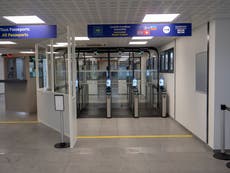MPs may not vote on any Brexit deal until after it has come into force, Jacob Rees-Mogg suggests
Parliament could be asked to ‘retrospectively correct’ domestic law, with New Year’s Eve deadline fast approaching
Your support helps us to tell the story
From reproductive rights to climate change to Big Tech, The Independent is on the ground when the story is developing. Whether it's investigating the financials of Elon Musk's pro-Trump PAC or producing our latest documentary, 'The A Word', which shines a light on the American women fighting for reproductive rights, we know how important it is to parse out the facts from the messaging.
At such a critical moment in US history, we need reporters on the ground. Your donation allows us to keep sending journalists to speak to both sides of the story.
The Independent is trusted by Americans across the entire political spectrum. And unlike many other quality news outlets, we choose not to lock Americans out of our reporting and analysis with paywalls. We believe quality journalism should be available to everyone, paid for by those who can afford it.
Your support makes all the difference.MPs may not vote on any Brexit deal until next year, after it has come into force, Jacob Rees-Mogg has suggested.
Parliament could be asked to “retrospectively correct” domestic law to recognise the agreement, with the New Year’s Eve deadline fast approaching, the Commons Leader said.
Mr Rees-Mogg admitted the move would be hugely controversial, saying “if anyone took it to court I think you would find yourselves in considerable difficulties”.
But he added: “Normally, you would expect a treaty to be ratified before it comes into force, but if both sides accept that ratification is done in a different way that is theoretically possible.”
The comments come as the two sides inch closer to an agreement, after stepping back from the brink of settling for a no-deal by extending their talks on Sunday.
The EU is believed to have diluted its threat of so-called “lightning tariffs” if the UK cuts its state aid, labour or environmental standards in future, gaining an economic advantage.
The UK has agreed to arbitration, but the two sides are yet to agree on the process for that, or what body would arbitrate – and it is unclear if the threat of unilateral tariffs has been dropped altogether.
In his regular ‘Moggcast’, Mr Rees-Mogg vowed: “Parliament will not be an obstacle to ratification.”
He told the interviewer that reaching the agreement was “what the two sides agree the ratification process should be”.
And he added, of the need for domestic law to catch up with the international treaty: “You could retrospectively correct it.
“You could I suppose, theoretically, ignore the law for a week – but that’s pretty unconstitutional territory and if anyone took it to court I think you would find yourselves in considerable difficulties.”
Ideally, there would be six days of debate in the Commons and the Lords between a deal being signed and it receiving Royal Assent, but the process could be “truncated”.
The scenario is becoming more likely because there are just 16 days until the UK leaves the single market and customs union – with the Christmas holidays intervening.
The clearest sign of whether a deal is moving closer will come when Mr Rees-Mogg announces, on Thursday, whether he will require the Commons to sit next week.
That would spark controversy, with the SNP warning it is “not safe" for MPs to travel to Westminster over the Christmas period.
It wants all MPs to be allowed to take part in Commons business virtually, because of the health risks posed by travelling during the Covid-19 pandemic.
“The Health Secretary stood at the despatch box yesterday and said there was a new strain of Covid and people shouldn't travel to Tier 3 areas - to a room full of people who had done exactly that,” said Patrick Grady, the SNP chief whip.
“If there is any possibility of the House sitting next week, or being recalled over Christmas, there has to be virtual participation for everyone because it's not safe to travel and given the East Coast Main Line is going to be closed - it's not going to be possible for most people to travel.”






Join our commenting forum
Join thought-provoking conversations, follow other Independent readers and see their replies
Comments